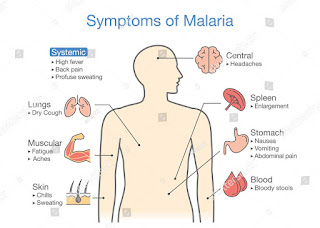Overview
Malaria is a life threatening disease caused by a parasite known as Plasmodium. It is transmitted in humans by female anopheles mosquitoes, which act as a vector for the disease.
Malaria is common in tropical and subtropical regions of the world. There are about 200 million cases of malaria per year, out of which, about 4 lakhs or 400,000 people die annually.
Causes
Malaria is caused by infection from Plasmodium. There are in total 4 species of Plasmodium that cause the disease. They are Plasmodium vivax, Plasmodium malaria, Plasmodium ovale and Plasmodium falciparum. Out of all four, Plasmodium falciparum is the most dangerous because it can cause death within 24 hours of infection.
These parasites reach our body with the help of female anopheles mosquitoes. Female anopheles lay eggs in water and need blood for nourishment of their eggs. They have a sucking mouth using which they suck our blood.
All species of Plasmodium need two hosts for completion of their life cycle. One being a female anopheles mosquito and the other being humans. When an anopheles female bites an infected human the spores of parasites enter its body. They develop into sporozoites inside the mosquito body. These mosquitoes bite humans, the sporozoites enter human blood.
The sporozoites attack the liver cells and start developing inside them. They burst the cells and spread in the body. Then they attack RBCs. They undergo sexual reproduction inside the RBCs and produce spores. When the process is completed, they rupture the RBC and spread to the whole body. This decreases the number of red blood cells in the body drastically. When another anopheles mosquito bite this person, the cycle starts all over again.
Symptoms
Symptoms of malaria are seen after 10 to 15 days after infection. This is the period when the parasitic cells are multiplying in the liver. The symptoms are seen when they start attacking and rupturing the red blood cells. The symptoms of malaria are as follows.
1.Malaria Attack
In this the person suffers very high fever and shaking chills. Then profuse sweating and then temperature becomes normal. This is recurring and happens multiple times within an hour duration.
2. Headache
3. Nausea
4. Vomiting
5. Fatigue
6. Anemia
7. Abdominal pain
8. Diarrhea
9. Muscle pain
10. Convulsions
Complications
Malaria is considered serious because of other complications that it might impose. The patient might even die if treatment is not given to him on time. There are various complications that come with malarial fever. They include.
1.Acute Anemia
If the number of RBCs becomes too less the person might die due to anemia.
2. Organ Failures
Malaria parasites attack the liver directly and destroy the cells there, so there is a chance for liver failure. Malarial infection might also lead to kidney failure and spleen rupture.
3. Cerebral Malaria
When the parasites start attacking the RBCs present in the brain, they cause swelling in the brain and brain damage. This can lead to coma and death.
4. Low blood sugar
The amount of sugar in blood decreases drastically at the time of malarial infection. Too low blood sugar can cause coma or death.
5. Pulmonary edema
Parasites cause accumulation of fluids in the lungs causing difficulty in breathing.
Treatment and Prevention
There is no vaccine available for protection against malaria. The only thing you can do is to go to a hospital for the first symptoms of the disease. The disease can only be cured by your immune system, and it takes proper care. You don't have anything in your hands in that case
But yes there is something that you can do. The female anopheles mosquitoes are the one that spread the disease. So you can do things that can prevent these mosquitoes from thriving in your area. Here are some tips that you can follow.
1.Wear full sleeve clothes while going out.
2. Use a mosquito repellent.
3. Use net to cover your bed at night.
4. So not let water accumulate anywhere near your home. If you see stagnant water somewhere with some translucent stuff floating or submerged in it, clean it immediately. It might be a breeding ground or eggs of the mosquitoes.
Conclusion
Malaria is a life threatening disease caused by mosquitoes. It is a disease that is most prevalent in the rainy season due to accumulation of water. You can use the given tips to save yourself from getting infected. If you see the symptoms in anyone, take them to the hospital immediately.
Stay Safe, Stay Healthy and fit and Stay tuned for more.
Please Share and Leave a comment if you liked it, it'll make our day.
Thank you for reading this.






Comments
Post a Comment